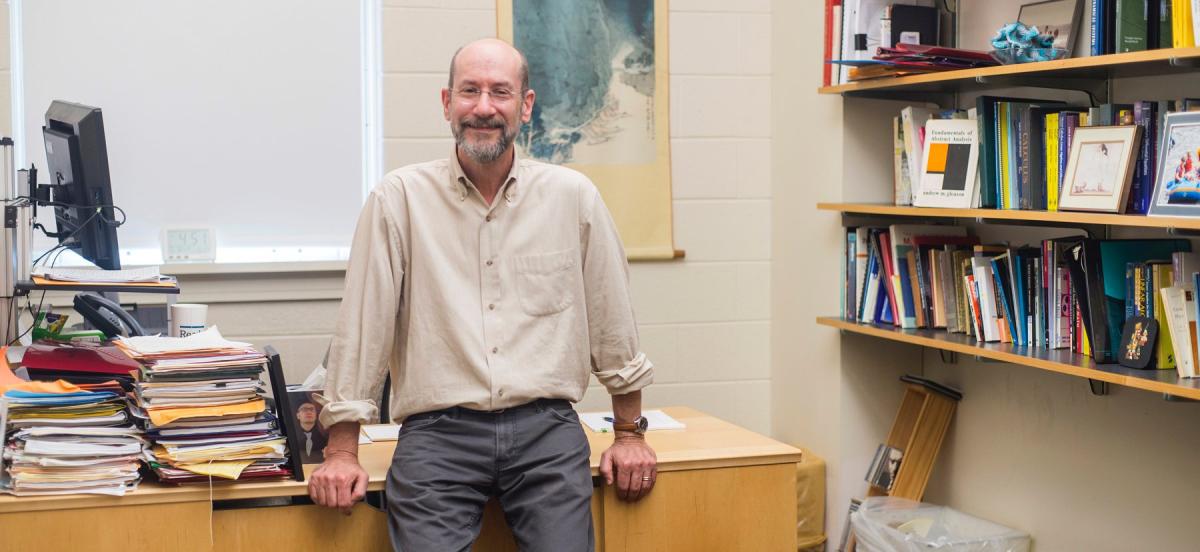Office Hour: Jeff Tecosky-Feldman

Photo: Patrick Montero
The senior lecturer of mathematics and statistics gives us a tour of his office.
Senior Lecturer of Mathematics and Statistics Jeff Tecosky-Feldman started at Haverford in 1987, teaching computer science courses before joining the Mathematics Department full-time in 1990. Known to students affectionately as “Jeff TF,” Tecosky-Feldman is one busy guy. Along with teaching courses in calculus, geometry, and linear algebra, he serves as faculty director of the Chesick Scholars Program, a four-year academic mentoring and leadership program for under-represented, under-resourced, or first-generation Haverford students that includes a residential summer program (in which he sometimes teaches). His interest in under-represented groups in science has also led him to become the director of MSP (formerly known as the Multicultural Scholars Program). And five years ago, he worked with Dean Michael Martinez to launch Horizons, which gives first-generation college students a jumpstart on the transition to college life with a five-day leadership development program before Customs. He also finds time to help run the annual Yiddish Culture Festival on campus.

➊ Math teaching tools: I like to bring physical things to class and use them to do active learning, instead of students watching me work a problem at the blackboard. These shapes are examples of polyhedra. [Models like these] aid ways of understanding the symmetries in each of these shapes. So, I’ll bring these in and have students work in pairs and solve problems with them. Also, because many students are interested in teaching high-school math, in my geometry class we explore a whole curriculum called patty-paper geometry. Patty-paper is the wax paper sheets used for hamburgers. Because they’re translucent, you can fold them and it’s easy to see the lines and then make conjectures about triangles. The cards and dice I used in a statistics curse.


➌ Students Association awards: These are some of my most prized possessions. Every year the graduating students vote for somebody, either a staff member or a faculty member. It says “This Prize is Awarded to a Faculty Member Who Gives Outstanding Service to the Haverford Community and Who Upholds the Qualities Intrinsic with a Haverford Education.” I think I’m prouder of those than anything I’ve ever won, really.

➍ Vintage Yiddish theater poster: Years ago, three Haverford professors who were fluent in Yiddish, started something called the Yiddish Culture Festival. They wanted to get students interested in Yiddish culture, so, they invited poets, and translators, and people who knew things about Eastern European culture to come and give lectures, and I attended these. I don’t speak Yiddish, but I had a grandmother who did, and I’ve always been interested in it. Well after a year or so, I said to them, “Do you guys have a mailing list? Do you have a schedule that you send out?” And none of them did, and so I got involved as an organizer [with Biology Professor Mel Santer, who died in 2015, Emeritus Professor of Classics Dan Gillis and Emeritus Professor of Psychology Sid Perloe] and we’ve been doing it for the last 22 years. It didn’t strike a chord with students, but it has become more and more popular amongst community members.

➎ Photos of his kids: That photo of my son Jacob [left] was taken when he was quite a bit younger. He’s 28 now and goes by the stage name Jacob Jax. He’s a professional magician in Las Vegas. He’s in a variety show right now, which is something new, but usually he works for himself, doing magic on the Las Vegas strip. And that’s my daughter, Eleanor, on the right. She’s 30. She was working with birds of prey for a while after she graduated from college. She did various internships at zoos, bird cognition labs, and sanctuaries, but she has since moved on. She has an M.A. in library science and she works at the Wharton School. I’m really proud of both of my kids.

➏ Book written by his undergraduate mentor: Professor Andy Gleason, who became my mentor and friend, used this in the very first math class I took at Harvard. The class was so advanced that he interviewed everybody who wanted to take it. I had taken three college-level math classes in high school and I thought I was hot stuff, but he said to me, “Well, you know, most of the students in this class will have had much more preparation than you.” That class really blew me out of the water. It started me on the path to becoming a mathematician, and it also proved to me the importance of having a good mentor.

➐ New MSP logo: MSP started more than 30 years ago, before I came to campus. It was the Minority Scholars Program then, and it was focused on science. Over time, it grew in numbers, and included all the disciplines and students who were not minorities. So, the name got changed to Multicultural Scholars Program. But students didn’t know who it was for. So we decided, “Why don’t we just call it MSP?” which can stand for a lot of different things. The way it works is we invite all the Haverford students who are either first-gen, low-income, or underrepresented in academia to roughly once-a-month evening workshops over dinner. These are typically run by upper-class students, so it’s student-to-student networking and mentoring, on subjects like “How do you succeed in this place? How do you pick classes?” We had one recently on how to pick a major, and one on how to do your taxes. —E. L.